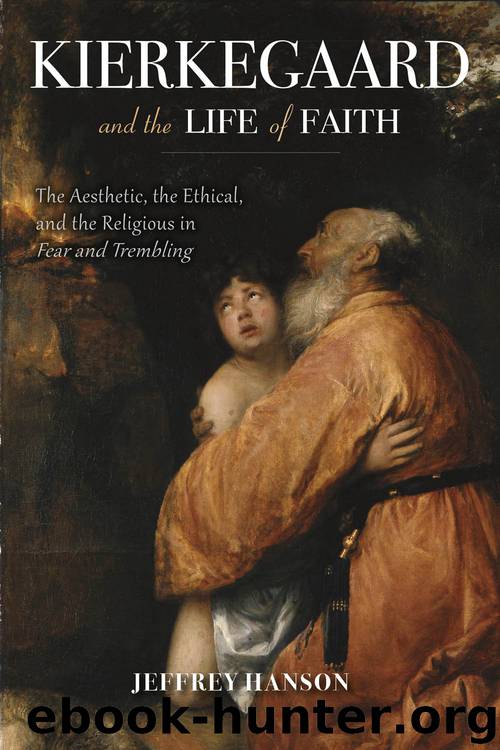Kierkegaard and the Life of Faith by Jeffrey A. Hanson

Author:Jeffrey A. Hanson
Language: eng
Format: epub
Publisher: Indiana University Press
Published: 2017-06-14T16:00:00+00:00
6Teleological Suspensions
WHEN SILENTIO POSES the question of Problema I—“Is there a Teleological Suspension of the Ethical?”1—we must keep in mind that Silentio himself does not explicitly answer this question, probably because it is a question that can be answered only by the reader herself, a question for which the reader must take personal responsibility. A natural way to approach such an answer would be to clarify what is at stake in the disjunction. It’s easier, perhaps, to frame the issue in terms of what is at stake if the answer to this question is no. If the answer is no, then the faith of Abraham, given expression in his joyful willingness to sacrifice his son at God’s command, is jeopardized to the point of being rendered void, indistinguishable from murder. “If faith cannot make it a holy act to be willing to murder his son,” Silentio writes, “then let the same judgment be passed on Abraham as on everyone else . . . In other words, if faith is taken away by becoming Nul and Nichts, all that remains is the brutal fact that Abraham meant to murder Isaac.”2
Not much more need be added to what has been said time and again about the teleological suspension and the point that its possible nonexistence would have fatal consequences for faith. I would like to advance a more developed reading. I intend to show that while Silentio’s critique takes as its proximate target Hegel’s conception of Sittlichkeit, the implications of his critique have comparably challenging results for a much broader range of ethical positions that exclude the phenomena of faith and sin. The first part of this demonstration consists in the argument that exclusion of sin is definitive of the limits of the ethical as universal, whether in its Hegelian form or considered more expansively. That the teleological suspension has wider implications than those that directly concern Hegel we can anticipate by pointing out Silentio’s observation that “no categories are needed other than what Greek philosophy had”3 if Sittlichkeit is ultimately exhaustive of the ethical as a whole. Kierkegaard had an abiding love of the Greeks, but he also consistently contrasted their insights with those that can be provided only by religious categories. More specifically, recall that the horizon for this interpretation is provided by Haufniensis’s contrast between “immanental” or “ethnical” “first ethics” and “second ethics.”4 As Silentio lacks these categories, he perhaps cannot see the full sweep of his own critique with the same clarity as, say, Anti-Climacus does.
The next part of this chapter consists in a consideration of what Hegel actually has to say in the works that Silentio explicitly cites, which I place in conversation with a more nuanced discussion of the relationship of the universal to the exception provided by Constantin Constantius. The reading of Constantius shows that Kierkegaard’s logic of the exception is bivalent, extending in the opposed directions of demonic sin and faith, and that this logic demolishes worldly wisdom about justice, fairness, and other canons of “first ethics.
Download
This site does not store any files on its server. We only index and link to content provided by other sites. Please contact the content providers to delete copyright contents if any and email us, we'll remove relevant links or contents immediately.
| Anthropology | Archaeology |
| Philosophy | Politics & Government |
| Social Sciences | Sociology |
| Women's Studies |
The Thibaults by Roger Martin Du Gard(1307)
the god delusion by richard dawkins(1086)
The Case for God by Karen Armstrong(961)
New Testament by Harper Bibles(812)
Not in His Image: Gnostic Vision, Sacred Ecology, and the Future of Belief by Lash John Lamb(751)
Not in His Image: Gnostic Vision, Sacred Ecology, And the Future of Belief by Lash John Lamb(744)
Spook by Mary Roach(716)
The Egyptian Book of the Dead by John Romer(680)
Atheism For Dummies (For Dummies (Religion & Spirituality)) by McGowan Dale(610)
God Is Not Great: How Religion Poisons Everything by Christopher Hitchens(567)
A History of God by Karen Armstrong(553)
The Rosicrucian Mysteries by Max Heindel(529)
Selected Writings by Thomas Aquinas(529)
Religion for Atheists by Alain de Botton(506)
Abandonment to Divine Providence by Jean-Pierre de Caussade(506)
The Seven Storey Mountain by Thomas Merton(505)
God Without Being by Jean-Luc Marion(492)
The Garden of the Prophet by Kahlil Gibran(484)
Kierkegaard by Stephen Backhouse(474)
